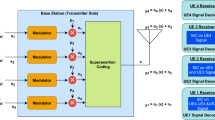Abstract
3G Wideband CDMA systems adopt the Orthogonal Variable Spreading Factor code tree as the channelization codes management for achieving high data rate transmission in personal multimedia communications. It assigns a single channelization code for each accepted connection. Nevertheless, it wastes the system capacity when the required rate is not powers of two of the basic rate. One good solution is to assign multiple codes for each accepted connection but it causes two inevitable drawbacks: long handoff delay and new call setup delay due to high complexity of processing with multiple channelization codes, and high cost of using more number of rake combiners. Especially, long handoff delay may result in more call dropping probability and higher Grade of Service, which will degrade significantly the utilization and revenue of the 3G cellular systems. Therefore, we propose herein an adaptive efficient codes determination algorithm based on the Markov Decision Process analysis approach to reduce the waste rate and reassignments significantly while providing fast handoff. Numerical results demonstrate that the proposed approach yields several advantages, including the lowest GOS, the least waste rate, and the least number of reassignments. Meanwhile, the optimal number of rake combiners is also analyzed in this paper.
Similar content being viewed by others
References
3GPP, http://www.3gpp.org
TR 45.5, The cdma2000 ITU-RTT candidate submission, TR 45-ISD/98.06.02.03 (May1998).
Universal Mobile Telecommunications System (UMTS), Requirements for the UMTS Terrestrial Radio Access System (UTRA) Concept Evaluation, ETSI Technical Report, UMTS 30.06 version 3.0.0 (Dec. 1997).
E. Dahlman, B. Gudmundson, M. Nilsson and A. Skold, UMTS/IMT-2000 based on wideband CDMA, IEEE Communication Magazine, 36(9) (1998) 70–80.
T. Minn and K.-Y. Siu, Dynamic assignment of orthogonal variable-spreading-factor codes in W-CDMA, IEEE Journal on Selected Areas in Communications 18(8) (2000) 1429–1440.
R.-G. Cheng and P. Li, OVSF Code channel assignment for IMT-2000, VTC 2000-Spring, 3 (2000) 2188–2192.
F. Shueh and W.-S.E. Chen, Code assignment for IMT-2000 on forward radio link, VTC 2001 Spring, 2 (2001) 906–910.
L.-H. Yen and M.-C. Tsou, An OVSF code assignment scheme utilizing multiple rake combiners for W-CDMA, IEEE ICC ’03, 5 (2003) 3312–3316.
T.H. Cormen, C.E. Leiserson and R. L. Rivest, Introduction to algorithms, McGraw-Hill Book Company (1990).
3GPP Technical Specification Group Radio Access Network 25.922, Radio resource management strategies (Release 5).
C.-M. Chao, Y.-C. Tseng and L.-C. Wan, Reducing internal and external fragmentations of OVSF codes in WCDMA systems with multiple codes, IEEE Transactions on Wireless Communications 4(4) (2005) 1516–1526.
N.D. Tripathi, J.H. Reed and H.F. VanLandinoham, Handoff in cellular systems, IEEE Wireless Communications 5(6) (1998) 26–37.
J.-H. Lee, T.-H. Jung, S.-U. Yoon, S.-K. Youm, and C.-H. Kang, An adaptive resource allocation mechanism including fast and reliable handoff in IP-based 3G wireless networks, IEEE Wireless Communications 7(6) (2000) 42–47.
H. Fathi, R. Prasad and S. Chakraborty, Mobility management for VoIP in 3G Systems: evaluation of low-latency handoff schemes, IEEE Wireless Communications 12(2) (2005) 96–104.
B.-J. Chang and R.-H. Hwang, Analysis of adaptive cost functions for dynamic update policies for QoS routing in hierarchical networks, Information Sciences 151 (2003) 1–26.
R.A. Howard, Dynamic programming and Markov processes. John Wiley & Sons, Inc. (1960).
R.-H. Hwang, J. F. Kurose and D. Towsley, MDP Routing for multirate loss networks, Computer Networks and ISDN System 34 (1999) 241–261.
B.-J. Chang and R.-H. Hwang, Performance analysis for hierarchical multirate loss networks, IEEE/ACM Transactions on Networking 12(1) (2004) 187–199.
S. Boumerdassi and A.-L. Beylot, Adaptive channel allocation for wireless PCN, Mobile Networks and Applications 4 (1999) 111–116.
Author information
Authors and Affiliations
Corresponding author
Additional information
This research was supported in part by the National Science Council of Taiwan, ROC, under contract NSC-93-2213-E-324-018.
Rights and permissions
About this article
Cite this article
Chang, BJ. Fast handoff with reducing waste rate approach for wireless resources management in UMTS mobile networks. Telecommun Syst 33, 333–352 (2006). https://doi.org/10.1007/s11235-006-9018-9
Published:
Issue Date:
DOI: https://doi.org/10.1007/s11235-006-9018-9




